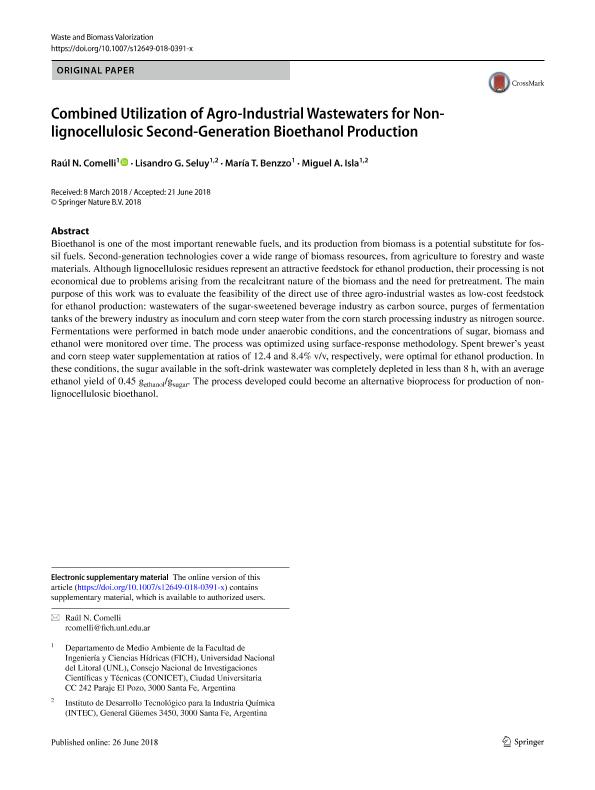Mostrar el registro sencillo del ítem
dc.contributor.author
Comelli, Raul Nicolas

dc.contributor.author
Seluy, Lisandro Gabriel

dc.contributor.author
Benzzo, María Teresita

dc.contributor.author
Isla, Miguel Angel

dc.date.available
2019-10-22T12:39:13Z
dc.date.issued
2018-06
dc.identifier.citation
Comelli, Raul Nicolas; Seluy, Lisandro Gabriel; Benzzo, María Teresita; Isla, Miguel Angel; Combined Utilization of Agro-Industrial Wastewaters for Non-lignocellulosic Second-Generation Bioethanol Production; Springer Netherlands; Waste and Biomass Valorization; 6-2018; 1-11
dc.identifier.issn
1877-2641
dc.identifier.uri
http://hdl.handle.net/11336/86811
dc.description.abstract
Abstract: Bioethanol is one of the most important renewable fuels, and its production from biomass is a potential substitute for fossil fuels. Second-generation technologies cover a wide range of biomass resources, from agriculture to forestry and waste materials. Although lignocellulosic residues represent an attractive feedstock for ethanol production, their processing is not economical due to problems arising from the recalcitrant nature of the biomass and the need for pretreatment. The main purpose of this work was to evaluate the feasibility of the direct use of three agro-industrial wastes as low-cost feedstock for ethanol production: wastewaters of the sugar-sweetened beverage industry as carbon source, purges of fermentation tanks of the brewery industry as inoculum and corn steep water from the corn starch processing industry as nitrogen source. Fermentations were performed in batch mode under anaerobic conditions, and the concentrations of sugar, biomass and ethanol were monitored over time. The process was optimized using surface-response methodology. Spent brewer’s yeast and corn steep water supplementation at ratios of 12.4 and 8.4% v/v, respectively, were optimal for ethanol production. In these conditions, the sugar available in the soft-drink wastewater was completely depleted in less than 8 h, with an average ethanol yield of 0.45 gethanol/gsugar. The process developed could become an alternative bioprocess for production of non-lignocellulosic bioethanol.
dc.format
application/pdf
dc.language.iso
eng
dc.publisher
Springer Netherlands
dc.rights
info:eu-repo/semantics/openAccess
dc.rights.uri
https://creativecommons.org/licenses/by-nc-sa/2.5/ar/
dc.subject
CORN-STEEP WATER
dc.subject
FERMENTATION
dc.subject
SPENT BREWER’S YEAST
dc.subject
SUGAR-SWEETENED BEVERAGES
dc.subject
VALORIZATION
dc.subject.classification
Bioprocesamiento Tecnológico, Biocatálisis, Fermentación

dc.subject.classification
Biotecnología Industrial

dc.subject.classification
INGENIERÍAS Y TECNOLOGÍAS

dc.title
Combined Utilization of Agro-Industrial Wastewaters for Non-lignocellulosic Second-Generation Bioethanol Production
dc.type
info:eu-repo/semantics/article
dc.type
info:ar-repo/semantics/artículo
dc.type
info:eu-repo/semantics/publishedVersion
dc.date.updated
2019-10-18T18:06:09Z
dc.journal.pagination
1-11
dc.journal.pais
Países Bajos

dc.description.fil
Fil: Comelli, Raul Nicolas. Universidad Nacional del Litoral; Argentina
dc.description.fil
Fil: Seluy, Lisandro Gabriel. Consejo Nacional de Investigaciones Científicas y Técnicas. Centro Científico Tecnológico Conicet - Santa Fe. Instituto de Desarrollo Tecnológico para la Industria Química. Universidad Nacional del Litoral. Instituto de Desarrollo Tecnológico para la Industria Química; Argentina
dc.description.fil
Fil: Benzzo, María Teresita. Universidad Nacional del Litoral; Argentina
dc.description.fil
Fil: Isla, Miguel Angel. Universidad Nacional del Litoral; Argentina
dc.journal.title
Waste and Biomass Valorization
dc.relation.alternativeid
info:eu-repo/semantics/altIdentifier/url/http://link.springer.com/10.1007/s12649-018-0391-x
dc.relation.alternativeid
info:eu-repo/semantics/altIdentifier/doi/http://dx.doi.org/10.1007/s12649-018-0391-x
Archivos asociados
